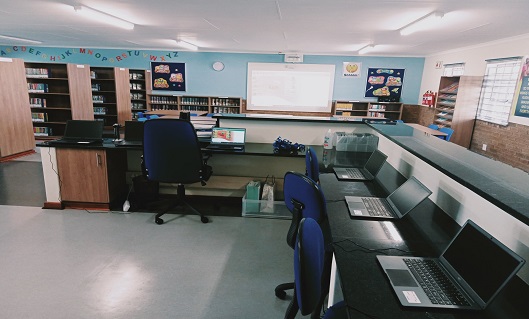Office of the Premier 2021/12/07 - 22:00

Panyaza Lesufi, Education MEC
When the Gauteng Department of Education launched the "Schools of the Future" programme six years ago, it studied the environment and leveraged the digital space to offer solutions tailored to suit emerging challenges.
When we launched the programme in January 2015, we never imagined that the COVID-19 pandemic would accelerate the digitisation of the way we live, work, and learn.
After all, more than ever before, mobile or hand-held technology is essential in everyday life - in homes, educational institutions, factories, offices, sports, health and law enforcement and all other fields of life.
We all know that rapid technological and social change often occurs during times of crisis, such as during wartime. So, while the education industry is under pressure now, it is entirely plausible that it will benefit from the current complex challenges.
Visions for the future
As an executive and political leader in education, I have recognised that two major visions of the future dominate current discussions about what societies, economies and the environment will be like in the years ahead.
During my trips around the province and during my visit to South Korea, I realised we should consider how to respond to changing socio-economic and environmental conditions; how individuals and societies can shape their worlds for the better; and how technology can be deployed to improve quality of life and the environments that support life.
The first of these two visions, conceptualised as the Fourth Industrial Revolution (4IR), promises a better world made possible through fresh advances in digital technologies and the progressive digitalisation of economy and society.
Since the launch of our Schools of the Future programme, the growth of information communication technology (ICT) has had a profound influence on education. Today, learners can pursue scientific, educational, and research goals using the internet.
The entrance of ICT, has led to the review of educational programmes and teaching methods.
ICT as a cornerstone of transformation
There are many reasons why technology plays a central role in creating effective learning communities. These include the potential of technology to increase our ability to work and learn from others who are distant in time and location.
For us, the pandemic and its associated lockdowns have accelerated the uptake of online registration and other digital platforms.
Within this context, my department has embarked on an extensive technological campaign to create awareness on the importance of early registration, processes, and procedures.
By using a secure online enrolment system, parents and guardians can register a child's information, thus minimising waiting times and paperwork at registration and ensuring the accuracy of information for all pupils.
We are excited that the online admissions application system is eradicating long queues at schools during the application period, creating a centralised database for planning purposes, enabling parents to access services at ease, ensuring that learners are placed within the legislative prescripts and of course helping us to adhere to COVID-19 protocols.
The premise should be that the educational system is a catalyst for the knowledge economy, but at the same time, it needs to adapt to the requirements of the 4IR.
4IR and disruption
Klaus Schwab, the founder of the World Economic Forum, mentioned that the term "revolution", be it related to industrial area ("industrial revolution") or to science and technology ("technical-scientific revolution") implies "abrupt and radical change", a change that suddenly takes place.
Schwab says the second industrial revolution created more industrial jobs and an increasing number of office jobs. The third industrial revolution reduced industrial jobs significantly, but more than compensated with jobs created in the office sector.
Therefore, in the first and second industrial revolutions, the labour had to adapt to different types of physical labour and then, in the third revolution, to adapt more and more to intellectual jobs, that is jobs based on information processing and knowledge.
Early stages
While the 4IR is in its early stages and cannot be described in detail, we are beginning to understand some of its characteristics: the use of artificial intelligence and of robots in an increasing number of areas that are not limited to business, including health care, education and even culture. The Internet connects more and more devices both in the business and domestic areas in such a way that almost everybody and everything becomes part of a global network and the capacity to collect and process vast amounts of data beyond human capabilities, just like our 2022 online application programme.
I am glad that in our five-year Gauteng Department of Education Roadmap of 2019-2024, we recognised that we could not view education in isolation from its own environment – the community, business, and government.
We also acknowledge that while keeping up to speed with technology can be a hard task, we cannot ignore the transformative potential of new technology, nor the need to equip learners with the requisite skills to cope with a digital world and to be employable.
Gauteng has made 4IR and- e-learning a critical component of our province's schools development programme. We cannot be left behind in the global race for talent, capital and ideas.
- Panyaza Lesufi is Gauteng Member of Executive Council for Education.
RELATED NEWS
No related news

